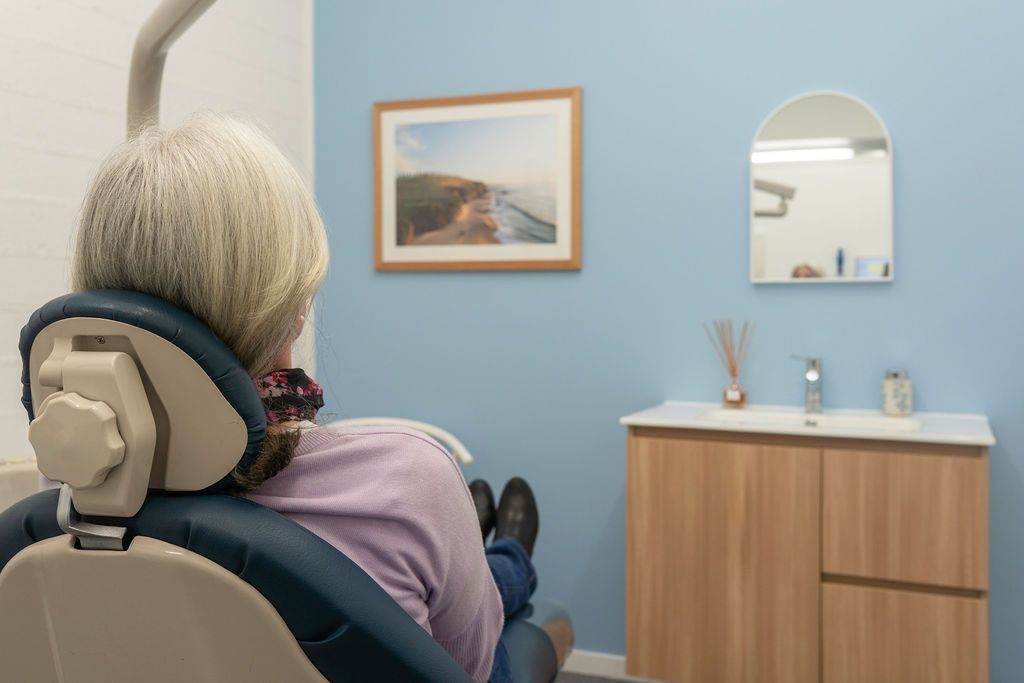Dentist for Seniors in Kiama
- Gentle care in a calm environment
- Care tailored to the specific needs of older adults
- DVA patients are welcome and bulk billed
Finding the right dentist can make a meaningful difference to your oral health and everyday comfort. At Kiama Family Dental, we provide care that’s tailored to the evolving needs of older adults – from routine check-ups to managing concerns such as gum recession, tooth wear or dry mouth. Our aim is to support each patient with clear communication, consistency in a calm, welcoming environment.
We recognise that dental visits may bring anxiety, so we take the time to help every person feel informed, respected and at ease.
We are also a registered Department of Veterans’ Affairs (DVA) provider and bulk bill eligible DVA patients.
Contact Kiama Family Dental on
(02) 4233 1313 to learn how we can support your oral health with continuity and care.
What Seniors’ Dentistry May Involve
Seniors’ dentistry typically includes regular examinations, professional cleaning and screenings tailored to each person’s health needs. Oral health concerns like gum recession, enamel wear, and tooth mobility will be monitored over time, with treatment adjusted as needed. In some cases, patients may need support managing dry mouth, medication-related side effects or the fit of existing dentures.
Our care is designed with comfort and clarity in mind, with a focus on creating a welcoming environment that helps patients feel at ease. We explain procedures in simple terms, take the time to answer questions and support patients in making informed decisions. Seniors’ dental care can assist in maintaining nutrition, daily comfort and confidence.
Frequently Asked Questions
What are the most common dental issues for older adults?
As people age, they may experience a range of oral health concerns that require monitoring and management. Common issues include gum recession, enamel wear, dry mouth (xerostomia), tooth mobility, root decay and sensitivity. Older dental work, such as fillings, crowns or dentures, may also require adjustment or replacement over time. Medications for chronic conditions can affect saliva production and increase the risk of decay or gum disease. In some cases, limited dexterity may make daily brushing and flossing more difficult, which can also impact oral health. Regular dental visits help identify these changes early and allow for treatment plans to be adjusted accordingly.
How often should seniors visit the dentist?
The recommended frequency of dental visits for seniors depends on individual needs and risk factors. For most older adults, a check-up and clean every six months is advised. However, those with ongoing issues – such as gum disease, dry mouth, or complex medical conditions – may benefit from more frequent reviews. Consistent care helps monitor age-related changes, maintain oral hygiene and address any concerns before they progress. Dentists may also use these appointments to provide guidance on managing oral health at home, including product recommendations and adapted techniques for those with reduced mobility.
Is dental care still important if a person has dentures?
Yes, dental care remains important even for those who wear full or partial dentures. Regular dental visits allow for the fit and function of dentures to be checked and adjusted, which can help prevent discomfort, difficulty speaking or eating, and pressure sores. The dentist may also examine the gums, tongue and other soft tissues for signs of irritation, infection or oral cancer – all of which may go unnoticed without routine care. In cases where natural teeth are still present alongside a denture, these teeth also need to be monitored for decay or mobility. Maintaining oral health with dentures can contribute to comfort, nutrition and overall quality of life.


